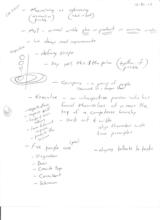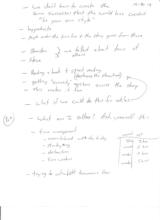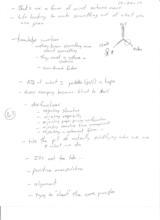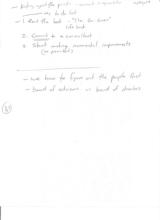|
Basic Assignments
|
Options & Settings
|
Main Time Information
|
||||||||||||||||||||||||||||
|
|
|
|
|
||||||
|
||||||
|
|
|
Notes:
|
|
Jonathan from Epic Enterprises Consulting came over to my house and we had a meeting. We covered a lot of ground and had a good meeting. See attached for a scan of my notes from the meeting. - Maximizing vs optimizing - Sometimes we (people) just try to push on the gas and get as much out of things as possible. Very natural - this is called maximizing. The other less common option is doing what is best or getting the optimal results vs the maximum results. - MVP - We have heard that MVP stands for minimal viable product. Well, it was explained today with a few other variables. What about minimal viable plan, minimal viable service, minimal viable (fill in the blank), etc.? Cool concept. - We always need improvement - We were talking about expectations, boundaries, and defining the scope. Without those pieces, you can get run over or overwhelmed pretty easy. Once a scope is defined, you can say yes (if you want to), and then say this is the price for doing that. Tie the two together if possible. - Definition of a company - a group of people - teamwork at a deeper level - We spent quite a bit of time talking about the term "Executive" and what does that mean. My current view of an executive is what I see on TV (media) of a boss at the top who commands his employees and somewhat has the final say of things... not something that I really want to be. As we talked, we started to redefine what an executive could be... Here are some of the ideas and concepts: An introspective person who has found themselves at or near the top of a competency hierarchy, who seeks out and wields or aligns themselves with true principles. Respect for other, respect for self, helps and loves others, loves to learn and improve, helps to protect the vision. I liked those ideas and concepts much more. I could do that type of being an executive. - There are five major roles that need to be fulfilled in a company. Instead of just roles, ideally, you actually have people in place who can carry each of these roles and own it. Otherwise you just have a smaller number wearing multiple hats. The five people are: An organizer, a doer, a creative type, a consultant, and a salesman. The goal is to align talents with tasks. - What is the definition of success? We don't have to create the same successes that the world has created. We can be our own style. - Byproducts and harnessing those different avenues. - People enter the timeline and the story goes from there. - We talked about lots of our people and what role and talents (attributes) they bring to the table. I listed off 15 to 20 key players that we deal with and have interactions with. - Jonathan wanted me to read a book, not just read it, but speed read it. He then took ten minutes and showed me how to do this... my definition won't do it justice, but here we go... Totally destroy the structure of the book, browse it, look for single words that are interesting, spoil it if you want to, jump around, create curiosity anchors across the story, make it fun. Then speed read it (glancing over things quickly) and pull out the main points. If something interests you, read deeper, otherwise just try to get the main points. - Dealing with speed reading, I was thinking that we could help people get interested in adilas that way... sometimes it may look too big or complicated but if people were to browse and find some curiosity anchors and then skim over some of the benefits and features, it may be a better way to consume it then trying to virtually read the whole thing. Just an idea. Make it fun. As a side note, I'm trying to head in that direction by working on the presentation gallery (non linear, visual, outline type format for a presentation or demo). - Ask yourself, what am I selling? Is it what you are thinking? - We went over some time management stuff. See my scans for a better version of this... but imagine a small grid with four things down the side. They are: Day to day (fires and being overwhelmed), strategizing, distractions, and time wasters. Then across the top, you have two columns, they are normal and optimal. Pretend that you have an 8 hour day. In the normal column, you have almost all of your day in the day to day (fires and being overwhelmed) column. You only get a few minutes on the strategizing, distractions, and time wasters columns. You are just buried and go from problem to problem (that's what it feels like). On the optimal side, you have about 2 hours of your day doing the day to day (fires and being overwhelmed). You have 5 hours of strategizing (trying to outwit tomorrow's fires), and half an hour each on the distractions and time wasters. These numbers aren't perfect, but represent a better way to do time management. - Trying to outwit tomorrow's fires - strategizing - From Jonathan - Books are a form of mind enhancement. - Life hacking to make something out of what you are given - if you hack it, you make it work how you want it to (at least kinda sorta). - A knowledge worker - what does that mean? They know something more about something. They need a rhythm or a cadence. They need to have a commitment factor to help them play. - "10% of what I peddle (sell) is hope." - Quote from Jonathan. I really liked that. I may start using something like that in my pitches. I sell potential, which is a form of hope. - At some point, every company becomes blind to itself. - We were talking about disfunctions and trying to reinvent the wheel on different topics. Jonathan was using a word that kept hitting me in the face. It was "rejecting", meaning rejecting or not allowing certain primary functions to take place or do their jobs... We talked about rejecting structure, rejecting responsibility, rejecting proper pricing configuration, rejecting executive time management, and rejecting a coherent form (what, who are we). - Take the pill of actually solidifying who we are and what we do - scope. - Dealing with time... It's not too late... - Positive manipulation - This may sound bad, but we all use this in one form or another. We talked about positive manipulation and how that is both best used and when and why. Lots of variables for it and also lots of reasons to use and employ that kind of a tactic or use that kind of tool. - Alignment to a core principle - that can get pretty deep. - Trying to "cheat" the core principles - what cause and effect relationships does that have and mean? This was a conversation about what are we doing and how are we virtually trying to cheat a number of known principles. Not trying to be dishonest, but not doing certain things on purpose. For example, not having an employee type structure, not having proper supply and demand pricing, not having a known form or structure (what does your business do and what products and/or services do you provide). - Kicking against the pricks - analogy used on animals in agriculture. The prick helped to prod the animal to do certain things. If the animal rebelled, it would kick against the prick and drive it in deeper (causing harm or more pain). We talked about this analogy and how sometimes if you try to avoid or reject certain things, you end up hurting yourself in business. - We talked about what makes a mom and pop shop a mom and pop shop? What could they do differently, if they wanted to? Key word, if they wanted to. How could certain principles help them become bigger - once again if they wanted to. People, talent, origination, funding, broader scope, marketing, product line, etc. Interesting conversation. Jonathan wasn't saying we (adilas) are a mom and pop shop, but we are on purpose not implementing all of the options, thus keeping us at a certain level. - He gave me three things to do: 1. Read the book - "The Go-Giver" - speed reading style, life hack, and non linear format. 2. Commit to a consultant. and 3. Start making incremental improvements (as prescribed). As a side note, I said that we were making incremental improvements and he said that would be good. He then added "as prescribed" and that somewhat changed the direction. Just a side note. - We have to figure out the people first. Then we can get to the other pieces. - Jonathan was recommending a board of advisors vs a board of directors. Small changes to focus, direction, and style. Interesting. |




